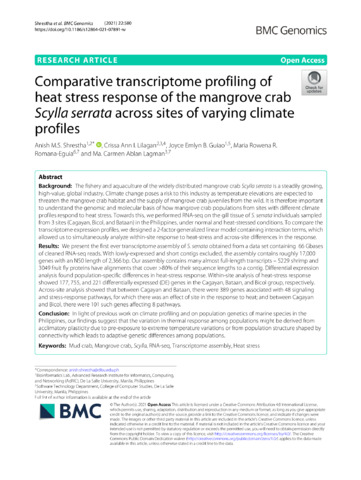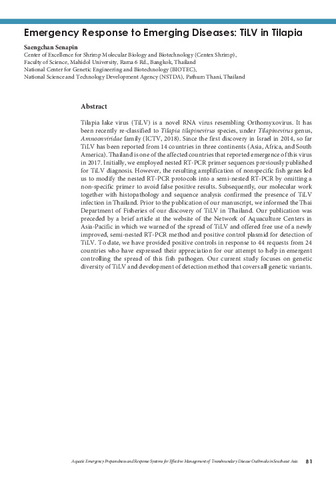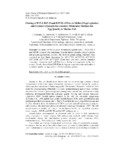| dc.contributor.author | Ablan-Lagman, Ma. Carmen | |
| dc.contributor.author | Meyer, Eli | |
| dc.contributor.editor | Quinitio, Emilia T. | |
| dc.contributor.editor | Parado-Estepa, Fe Dolores | |
| dc.contributor.editor | Coloso, Relicardo M. | |
| dc.date.accessioned | 2017-08-25T08:56:04Z | |
| dc.date.accessioned | 2017-08-25T16:29:29Z | |
| dc.date.available | 2017-08-25T08:56:04Z | |
| dc.date.available | 2017-08-25T16:29:29Z | |
| dc.date.issued | 2017 | |
| dc.identifier.citation | Ablan-Lagman, M. C., & Meyer, E. (2017). High throughput RNA sequencing reveals temperature tolerance mechanisms in Scylla serrata. In E. T. Quinitio, F. D. Parado-Estepa, & R. M. Coloso (Eds.), Philippines : In the forefront of the mud crab industry development : proceedings of the 1st National Mud Crab Congress, 16-18 November 2015, Iloilo City, Philippines (p. 140). Tigbauan, Iloilo, Philippines: Aquaculture Department, Southeast Asian Fisheries Development Center. | en |
| dc.identifier.isbn | 9789719931072 | |
| dc.identifier.uri | http://hdl.handle.net/10862/3174 | |
| dc.description | Abstract only. | en |
| dc.description.abstract | The effects of increasing temperature from global climate change threaten the sustainability and production of mud crabs from farms and wild populations in mangroves. Adaptation of mud crab populations to temperature stress is difficult to evaluate until now, with the emergence of RNA-Seq, a method which evaluates total mRNA expression under different conditions. In this study, 10 individuals each of S. serrata from Buguey, Cagayan were exposed to 26~’C and 32~’C for two weeks and the mRNA profiles were compared based on 186 million high quality pair-end reads which were aligned to a S. serrata reference transcriptome assembled de novo from 24,350 contigs with an average N50 of 1564 bp. Temperature related differences in gene expression were not significantly detected between the control and treatment groups and this was mostly due to the highly expressed genes such as the low and high molecular weight heat shock proteins. However, variations were greater among genes involved in the process of cell cycle regulation, the dissimilation processes such as oxidative phosphorylation, reproduction and transport across membranes. Greater differences were observed between immature or mature males and females. | en |
| dc.language.iso | en | en |
| dc.publisher | Aquaculture Department, Southeast Asian Fisheries Development Center | en |
| dc.subject | Scylla | en |
| dc.subject | Philippines | en |
| dc.title | High throughput RNA sequencing reveals temperature tolerance mechanisms in Scylla serrata | en |
| dc.type | Conference paper | en |
| dc.citation.spage | 140 | |
| dc.subject.asfa | acclimatization | en |
| dc.subject.asfa | cells | en |
| dc.subject.asfa | climate change | en |
| dc.subject.asfa | crab culture | en |
| dc.subject.asfa | gene expression | en |
| dc.subject.asfa | mangroves | en |
| dc.subject.asfa | marine crustaceans | en |
| dc.subject.asfa | molecular structure | en |
| dc.subject.asfa | population | en |
| dc.subject.asfa | RNA | en |
| dc.subject.asfa | rna sequencing | en |
| dc.subject.asfa | sex differences | en |
| dc.subject.asfa | sustainability | en |
| dc.subject.asfa | temperature effects | en |
| dc.citation.conferenceTitle | Philippines : In the forefront of the mud crab industry development : proceedings of the 1st National Mud Crab Congress, 16-18 November 2015, Iloilo City, Philippines | en |



